Halal Service Expectations of Muslim Travellers in Non-Muslim Hotels
VerifiedAdded on 2022/08/19
|27
|8406
|11
Report
AI Summary
This research paper delves into the expectations of Muslim travelers regarding halal services provided by hotels in non-Muslim countries. It begins by highlighting the significance of religion in shaping lifestyle and preferences, particularly for Muslims who are heavily influenced by halal practices. The paper examines the current state of hotels in non-Muslim countries, the specific expectations of Muslim travelers, and potential strategies for hotels to meet these needs. Supported by a survey, the research emphasizes the importance of halal services for Muslim customers and recommends strategies for hotel incorporation. The paper outlines the research objectives, including determining current perceptions of hotels, identifying issues faced by Muslim travelers, and recommending effective strategies. It poses research questions and presents hypotheses to guide the study. A comprehensive literature review covers Islamic perceptions, halal tourism, and the perceptions of non-Muslim countries, providing a solid foundation for the research. The paper also discusses halal logistics, willingness to pay for halal services, and the demand for halal services, all critical aspects of the halal tourism industry. The study's findings aim to provide valuable insights for the hospitality industry in catering to the growing market of Muslim travelers.
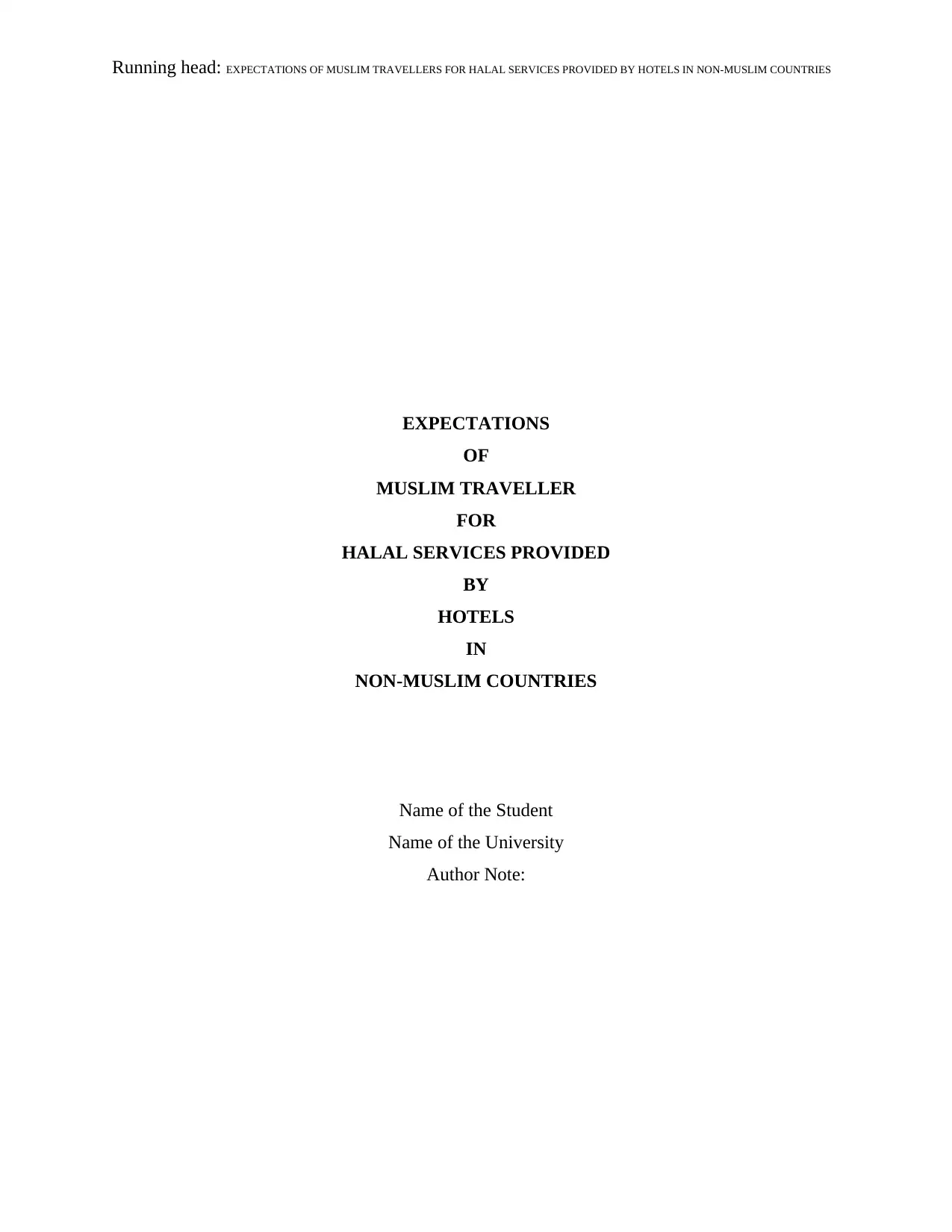
Running head: EXPECTATIONS OF MUSLIM TRAVELLERS FOR HALAL SERVICES PROVIDED BY HOTELS IN NON-MUSLIM COUNTRIES
EXPECTATIONS
OF
MUSLIM TRAVELLER
FOR
HALAL SERVICES PROVIDED
BY
HOTELS
IN
NON-MUSLIM COUNTRIES
Name of the Student
Name of the University
Author Note:
EXPECTATIONS
OF
MUSLIM TRAVELLER
FOR
HALAL SERVICES PROVIDED
BY
HOTELS
IN
NON-MUSLIM COUNTRIES
Name of the Student
Name of the University
Author Note:
Paraphrase This Document
Need a fresh take? Get an instant paraphrase of this document with our AI Paraphraser
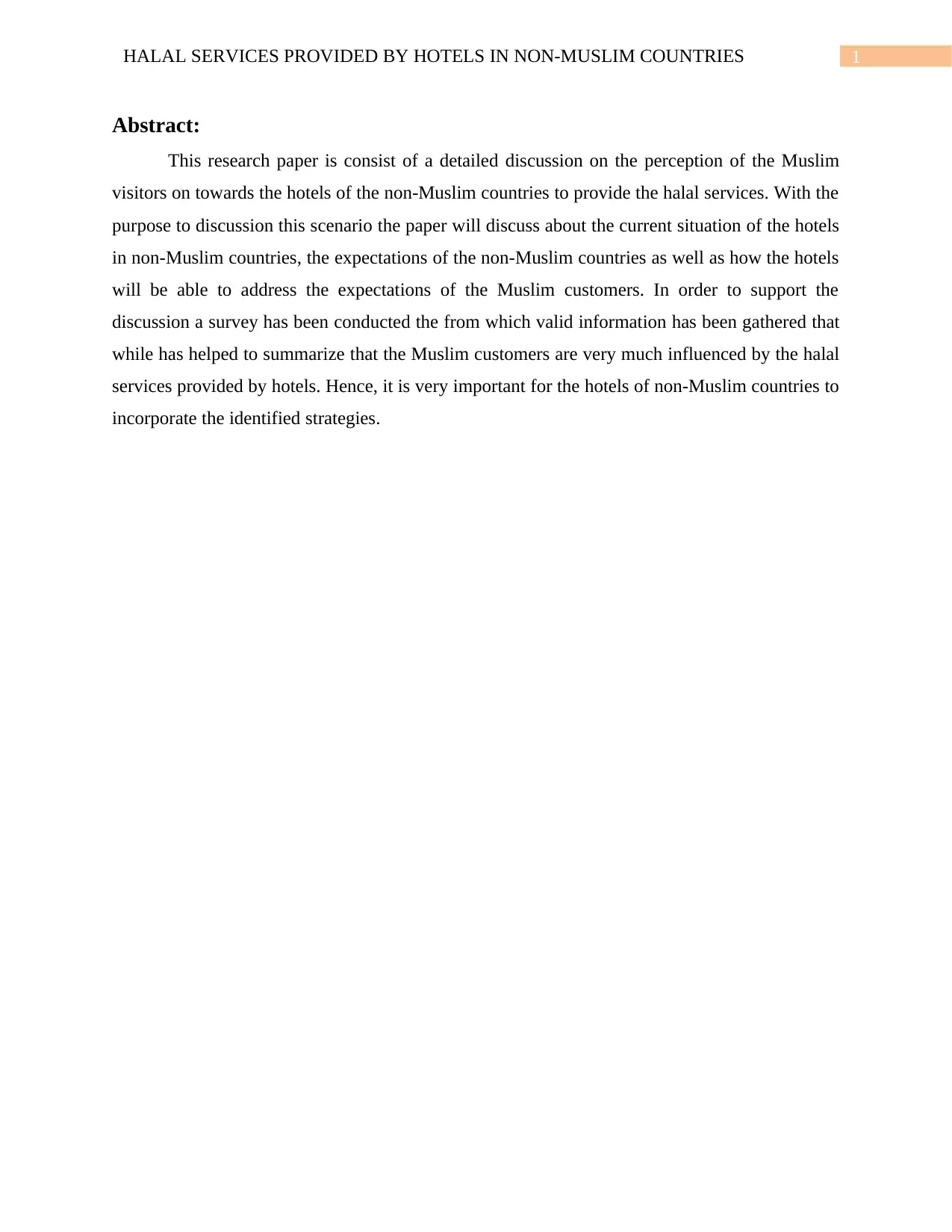
1HALAL SERVICES PROVIDED BY HOTELS IN NON-MUSLIM COUNTRIES
Abstract:
This research paper is consist of a detailed discussion on the perception of the Muslim
visitors on towards the hotels of the non-Muslim countries to provide the halal services. With the
purpose to discussion this scenario the paper will discuss about the current situation of the hotels
in non-Muslim countries, the expectations of the non-Muslim countries as well as how the hotels
will be able to address the expectations of the Muslim customers. In order to support the
discussion a survey has been conducted the from which valid information has been gathered that
while has helped to summarize that the Muslim customers are very much influenced by the halal
services provided by hotels. Hence, it is very important for the hotels of non-Muslim countries to
incorporate the identified strategies.
Abstract:
This research paper is consist of a detailed discussion on the perception of the Muslim
visitors on towards the hotels of the non-Muslim countries to provide the halal services. With the
purpose to discussion this scenario the paper will discuss about the current situation of the hotels
in non-Muslim countries, the expectations of the non-Muslim countries as well as how the hotels
will be able to address the expectations of the Muslim customers. In order to support the
discussion a survey has been conducted the from which valid information has been gathered that
while has helped to summarize that the Muslim customers are very much influenced by the halal
services provided by hotels. Hence, it is very important for the hotels of non-Muslim countries to
incorporate the identified strategies.
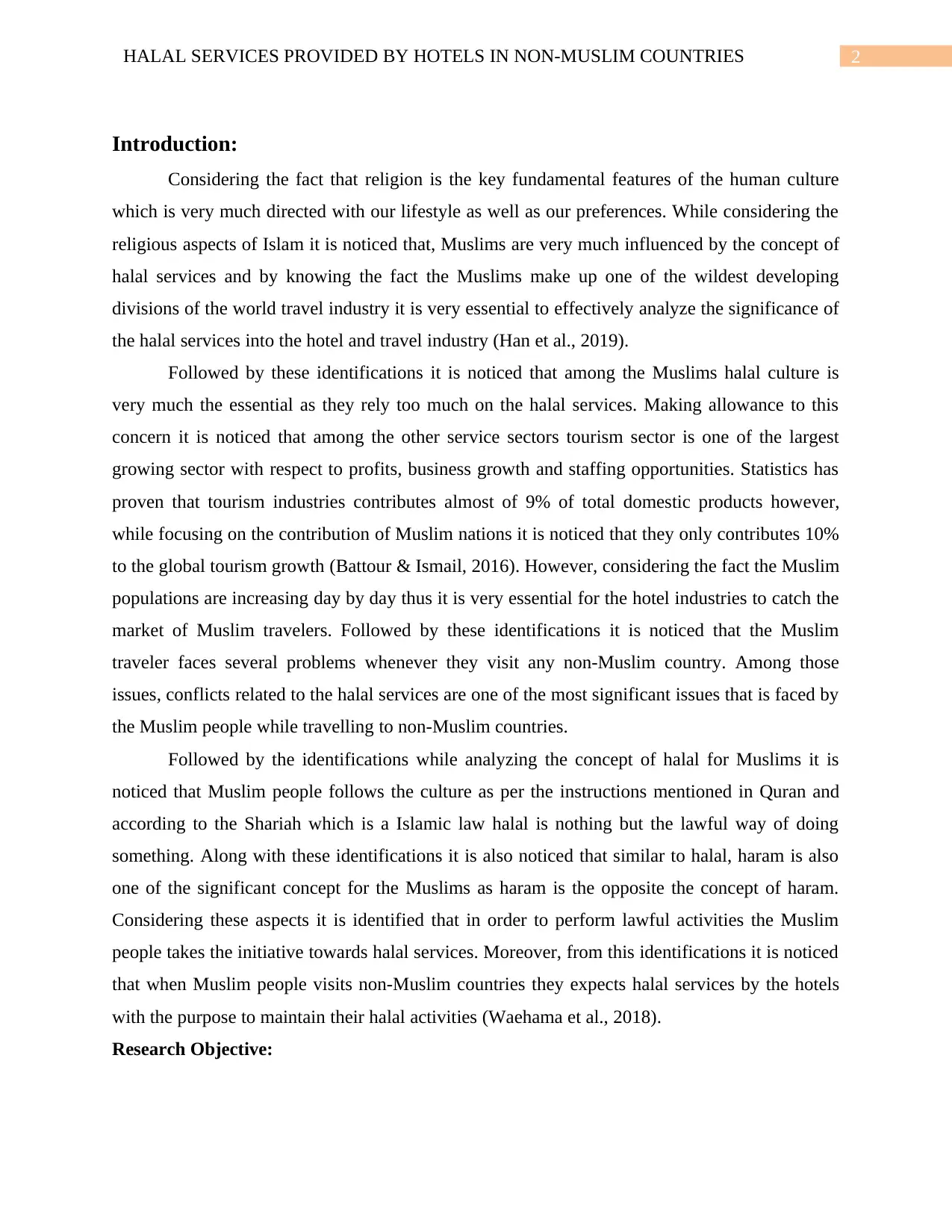
2HALAL SERVICES PROVIDED BY HOTELS IN NON-MUSLIM COUNTRIES
Introduction:
Considering the fact that religion is the key fundamental features of the human culture
which is very much directed with our lifestyle as well as our preferences. While considering the
religious aspects of Islam it is noticed that, Muslims are very much influenced by the concept of
halal services and by knowing the fact the Muslims make up one of the wildest developing
divisions of the world travel industry it is very essential to effectively analyze the significance of
the halal services into the hotel and travel industry (Han et al., 2019).
Followed by these identifications it is noticed that among the Muslims halal culture is
very much the essential as they rely too much on the halal services. Making allowance to this
concern it is noticed that among the other service sectors tourism sector is one of the largest
growing sector with respect to profits, business growth and staffing opportunities. Statistics has
proven that tourism industries contributes almost of 9% of total domestic products however,
while focusing on the contribution of Muslim nations it is noticed that they only contributes 10%
to the global tourism growth (Battour & Ismail, 2016). However, considering the fact the Muslim
populations are increasing day by day thus it is very essential for the hotel industries to catch the
market of Muslim travelers. Followed by these identifications it is noticed that the Muslim
traveler faces several problems whenever they visit any non-Muslim country. Among those
issues, conflicts related to the halal services are one of the most significant issues that is faced by
the Muslim people while travelling to non-Muslim countries.
Followed by the identifications while analyzing the concept of halal for Muslims it is
noticed that Muslim people follows the culture as per the instructions mentioned in Quran and
according to the Shariah which is a Islamic law halal is nothing but the lawful way of doing
something. Along with these identifications it is also noticed that similar to halal, haram is also
one of the significant concept for the Muslims as haram is the opposite the concept of haram.
Considering these aspects it is identified that in order to perform lawful activities the Muslim
people takes the initiative towards halal services. Moreover, from this identifications it is noticed
that when Muslim people visits non-Muslim countries they expects halal services by the hotels
with the purpose to maintain their halal activities (Waehama et al., 2018).
Research Objective:
Introduction:
Considering the fact that religion is the key fundamental features of the human culture
which is very much directed with our lifestyle as well as our preferences. While considering the
religious aspects of Islam it is noticed that, Muslims are very much influenced by the concept of
halal services and by knowing the fact the Muslims make up one of the wildest developing
divisions of the world travel industry it is very essential to effectively analyze the significance of
the halal services into the hotel and travel industry (Han et al., 2019).
Followed by these identifications it is noticed that among the Muslims halal culture is
very much the essential as they rely too much on the halal services. Making allowance to this
concern it is noticed that among the other service sectors tourism sector is one of the largest
growing sector with respect to profits, business growth and staffing opportunities. Statistics has
proven that tourism industries contributes almost of 9% of total domestic products however,
while focusing on the contribution of Muslim nations it is noticed that they only contributes 10%
to the global tourism growth (Battour & Ismail, 2016). However, considering the fact the Muslim
populations are increasing day by day thus it is very essential for the hotel industries to catch the
market of Muslim travelers. Followed by these identifications it is noticed that the Muslim
traveler faces several problems whenever they visit any non-Muslim country. Among those
issues, conflicts related to the halal services are one of the most significant issues that is faced by
the Muslim people while travelling to non-Muslim countries.
Followed by the identifications while analyzing the concept of halal for Muslims it is
noticed that Muslim people follows the culture as per the instructions mentioned in Quran and
according to the Shariah which is a Islamic law halal is nothing but the lawful way of doing
something. Along with these identifications it is also noticed that similar to halal, haram is also
one of the significant concept for the Muslims as haram is the opposite the concept of haram.
Considering these aspects it is identified that in order to perform lawful activities the Muslim
people takes the initiative towards halal services. Moreover, from this identifications it is noticed
that when Muslim people visits non-Muslim countries they expects halal services by the hotels
with the purpose to maintain their halal activities (Waehama et al., 2018).
Research Objective:
⊘ This is a preview!⊘
Do you want full access?
Subscribe today to unlock all pages.

Trusted by 1+ million students worldwide
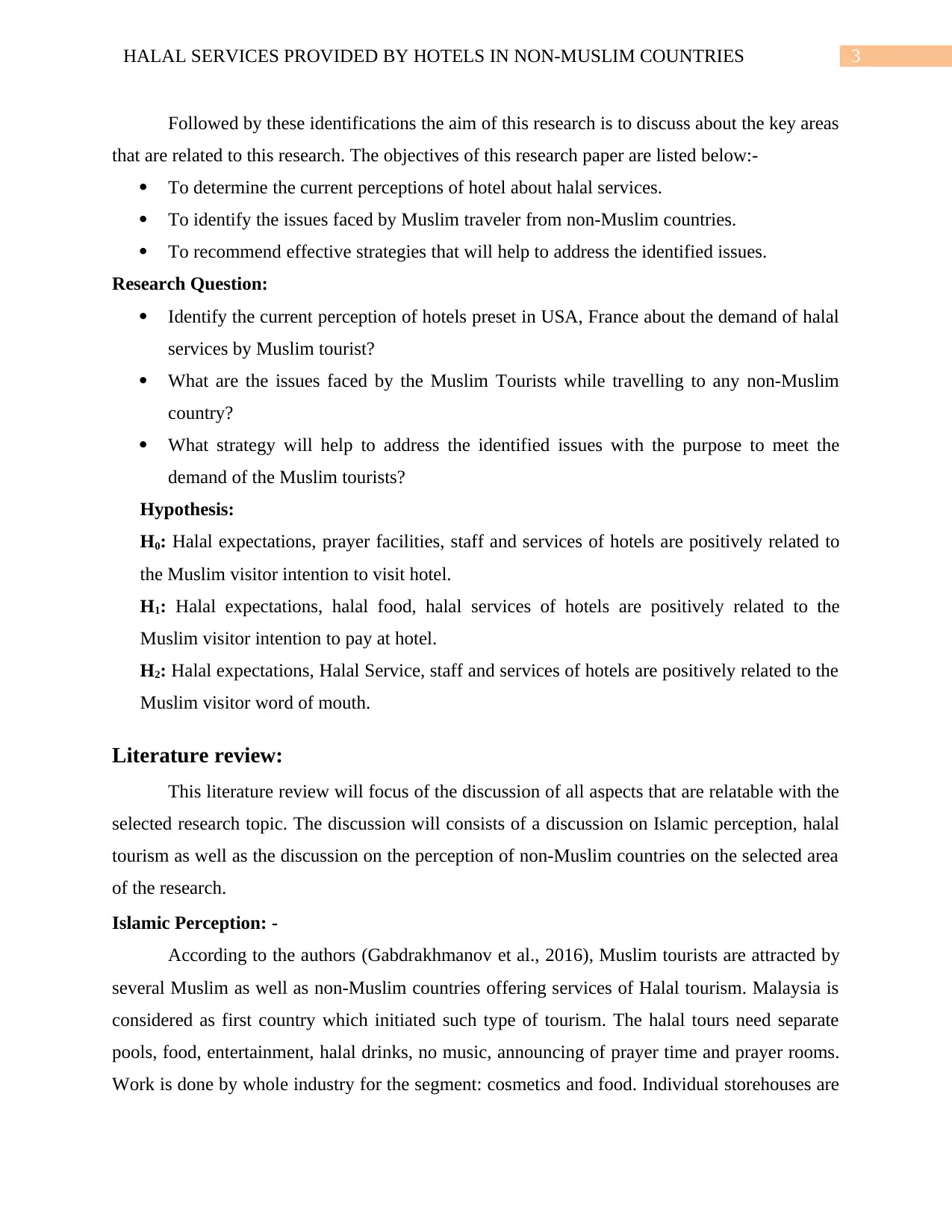
3HALAL SERVICES PROVIDED BY HOTELS IN NON-MUSLIM COUNTRIES
Followed by these identifications the aim of this research is to discuss about the key areas
that are related to this research. The objectives of this research paper are listed below:-
To determine the current perceptions of hotel about halal services.
To identify the issues faced by Muslim traveler from non-Muslim countries.
To recommend effective strategies that will help to address the identified issues.
Research Question:
Identify the current perception of hotels preset in USA, France about the demand of halal
services by Muslim tourist?
What are the issues faced by the Muslim Tourists while travelling to any non-Muslim
country?
What strategy will help to address the identified issues with the purpose to meet the
demand of the Muslim tourists?
Hypothesis:
H0: Halal expectations, prayer facilities, staff and services of hotels are positively related to
the Muslim visitor intention to visit hotel.
H1: Halal expectations, halal food, halal services of hotels are positively related to the
Muslim visitor intention to pay at hotel.
H2: Halal expectations, Halal Service, staff and services of hotels are positively related to the
Muslim visitor word of mouth.
Literature review:
This literature review will focus of the discussion of all aspects that are relatable with the
selected research topic. The discussion will consists of a discussion on Islamic perception, halal
tourism as well as the discussion on the perception of non-Muslim countries on the selected area
of the research.
Islamic Perception: -
According to the authors (Gabdrakhmanov et al., 2016), Muslim tourists are attracted by
several Muslim as well as non-Muslim countries offering services of Halal tourism. Malaysia is
considered as first country which initiated such type of tourism. The halal tours need separate
pools, food, entertainment, halal drinks, no music, announcing of prayer time and prayer rooms.
Work is done by whole industry for the segment: cosmetics and food. Individual storehouses are
Followed by these identifications the aim of this research is to discuss about the key areas
that are related to this research. The objectives of this research paper are listed below:-
To determine the current perceptions of hotel about halal services.
To identify the issues faced by Muslim traveler from non-Muslim countries.
To recommend effective strategies that will help to address the identified issues.
Research Question:
Identify the current perception of hotels preset in USA, France about the demand of halal
services by Muslim tourist?
What are the issues faced by the Muslim Tourists while travelling to any non-Muslim
country?
What strategy will help to address the identified issues with the purpose to meet the
demand of the Muslim tourists?
Hypothesis:
H0: Halal expectations, prayer facilities, staff and services of hotels are positively related to
the Muslim visitor intention to visit hotel.
H1: Halal expectations, halal food, halal services of hotels are positively related to the
Muslim visitor intention to pay at hotel.
H2: Halal expectations, Halal Service, staff and services of hotels are positively related to the
Muslim visitor word of mouth.
Literature review:
This literature review will focus of the discussion of all aspects that are relatable with the
selected research topic. The discussion will consists of a discussion on Islamic perception, halal
tourism as well as the discussion on the perception of non-Muslim countries on the selected area
of the research.
Islamic Perception: -
According to the authors (Gabdrakhmanov et al., 2016), Muslim tourists are attracted by
several Muslim as well as non-Muslim countries offering services of Halal tourism. Malaysia is
considered as first country which initiated such type of tourism. The halal tours need separate
pools, food, entertainment, halal drinks, no music, announcing of prayer time and prayer rooms.
Work is done by whole industry for the segment: cosmetics and food. Individual storehouses are
Paraphrase This Document
Need a fresh take? Get an instant paraphrase of this document with our AI Paraphraser
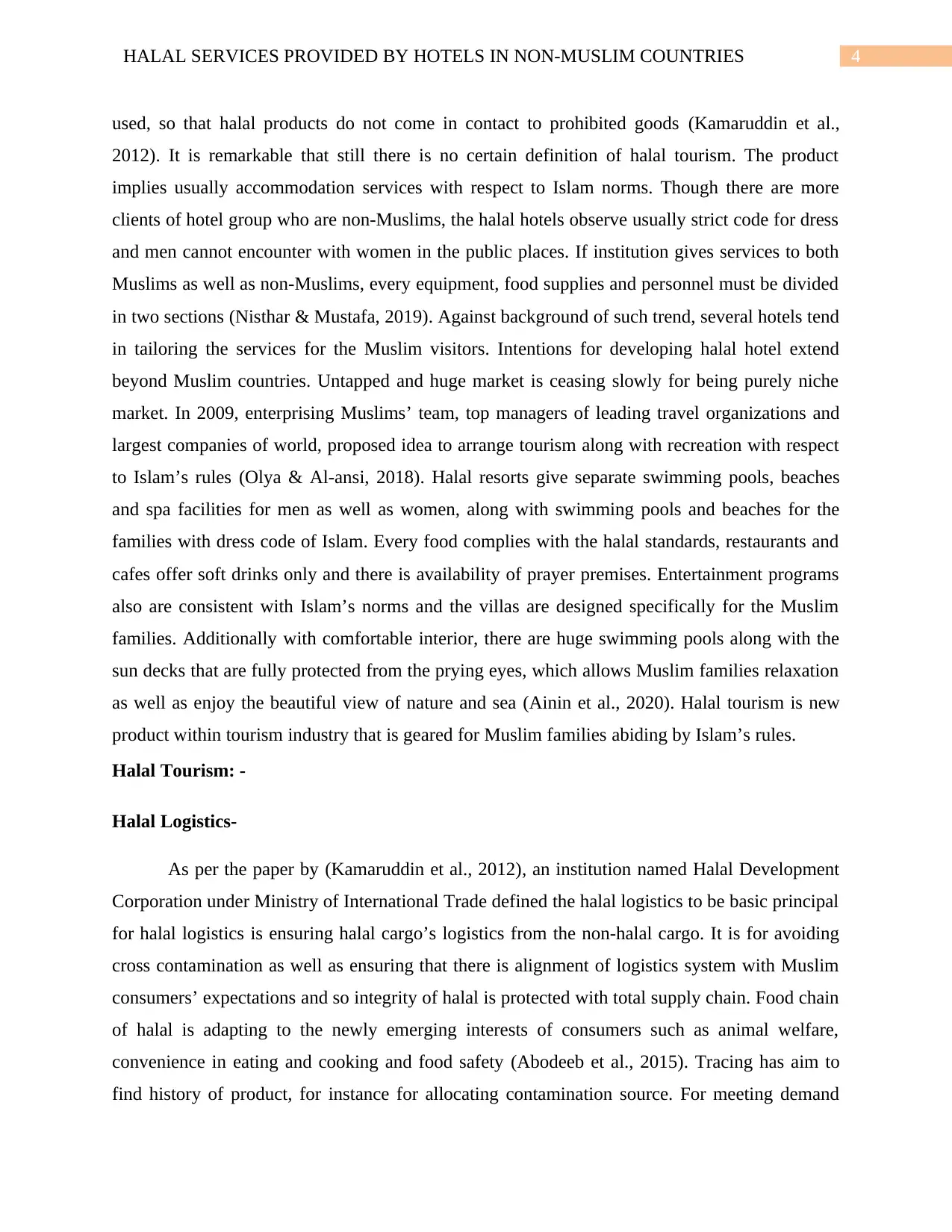
4HALAL SERVICES PROVIDED BY HOTELS IN NON-MUSLIM COUNTRIES
used, so that halal products do not come in contact to prohibited goods (Kamaruddin et al.,
2012). It is remarkable that still there is no certain definition of halal tourism. The product
implies usually accommodation services with respect to Islam norms. Though there are more
clients of hotel group who are non-Muslims, the halal hotels observe usually strict code for dress
and men cannot encounter with women in the public places. If institution gives services to both
Muslims as well as non-Muslims, every equipment, food supplies and personnel must be divided
in two sections (Nisthar & Mustafa, 2019). Against background of such trend, several hotels tend
in tailoring the services for the Muslim visitors. Intentions for developing halal hotel extend
beyond Muslim countries. Untapped and huge market is ceasing slowly for being purely niche
market. In 2009, enterprising Muslims’ team, top managers of leading travel organizations and
largest companies of world, proposed idea to arrange tourism along with recreation with respect
to Islam’s rules (Olya & Al-ansi, 2018). Halal resorts give separate swimming pools, beaches
and spa facilities for men as well as women, along with swimming pools and beaches for the
families with dress code of Islam. Every food complies with the halal standards, restaurants and
cafes offer soft drinks only and there is availability of prayer premises. Entertainment programs
also are consistent with Islam’s norms and the villas are designed specifically for the Muslim
families. Additionally with comfortable interior, there are huge swimming pools along with the
sun decks that are fully protected from the prying eyes, which allows Muslim families relaxation
as well as enjoy the beautiful view of nature and sea (Ainin et al., 2020). Halal tourism is new
product within tourism industry that is geared for Muslim families abiding by Islam’s rules.
Halal Tourism: -
Halal Logistics-
As per the paper by (Kamaruddin et al., 2012), an institution named Halal Development
Corporation under Ministry of International Trade defined the halal logistics to be basic principal
for halal logistics is ensuring halal cargo’s logistics from the non-halal cargo. It is for avoiding
cross contamination as well as ensuring that there is alignment of logistics system with Muslim
consumers’ expectations and so integrity of halal is protected with total supply chain. Food chain
of halal is adapting to the newly emerging interests of consumers such as animal welfare,
convenience in eating and cooking and food safety (Abodeeb et al., 2015). Tracing has aim to
find history of product, for instance for allocating contamination source. For meeting demand
used, so that halal products do not come in contact to prohibited goods (Kamaruddin et al.,
2012). It is remarkable that still there is no certain definition of halal tourism. The product
implies usually accommodation services with respect to Islam norms. Though there are more
clients of hotel group who are non-Muslims, the halal hotels observe usually strict code for dress
and men cannot encounter with women in the public places. If institution gives services to both
Muslims as well as non-Muslims, every equipment, food supplies and personnel must be divided
in two sections (Nisthar & Mustafa, 2019). Against background of such trend, several hotels tend
in tailoring the services for the Muslim visitors. Intentions for developing halal hotel extend
beyond Muslim countries. Untapped and huge market is ceasing slowly for being purely niche
market. In 2009, enterprising Muslims’ team, top managers of leading travel organizations and
largest companies of world, proposed idea to arrange tourism along with recreation with respect
to Islam’s rules (Olya & Al-ansi, 2018). Halal resorts give separate swimming pools, beaches
and spa facilities for men as well as women, along with swimming pools and beaches for the
families with dress code of Islam. Every food complies with the halal standards, restaurants and
cafes offer soft drinks only and there is availability of prayer premises. Entertainment programs
also are consistent with Islam’s norms and the villas are designed specifically for the Muslim
families. Additionally with comfortable interior, there are huge swimming pools along with the
sun decks that are fully protected from the prying eyes, which allows Muslim families relaxation
as well as enjoy the beautiful view of nature and sea (Ainin et al., 2020). Halal tourism is new
product within tourism industry that is geared for Muslim families abiding by Islam’s rules.
Halal Tourism: -
Halal Logistics-
As per the paper by (Kamaruddin et al., 2012), an institution named Halal Development
Corporation under Ministry of International Trade defined the halal logistics to be basic principal
for halal logistics is ensuring halal cargo’s logistics from the non-halal cargo. It is for avoiding
cross contamination as well as ensuring that there is alignment of logistics system with Muslim
consumers’ expectations and so integrity of halal is protected with total supply chain. Food chain
of halal is adapting to the newly emerging interests of consumers such as animal welfare,
convenience in eating and cooking and food safety (Abodeeb et al., 2015). Tracing has aim to
find history of product, for instance for allocating contamination source. For meeting demand
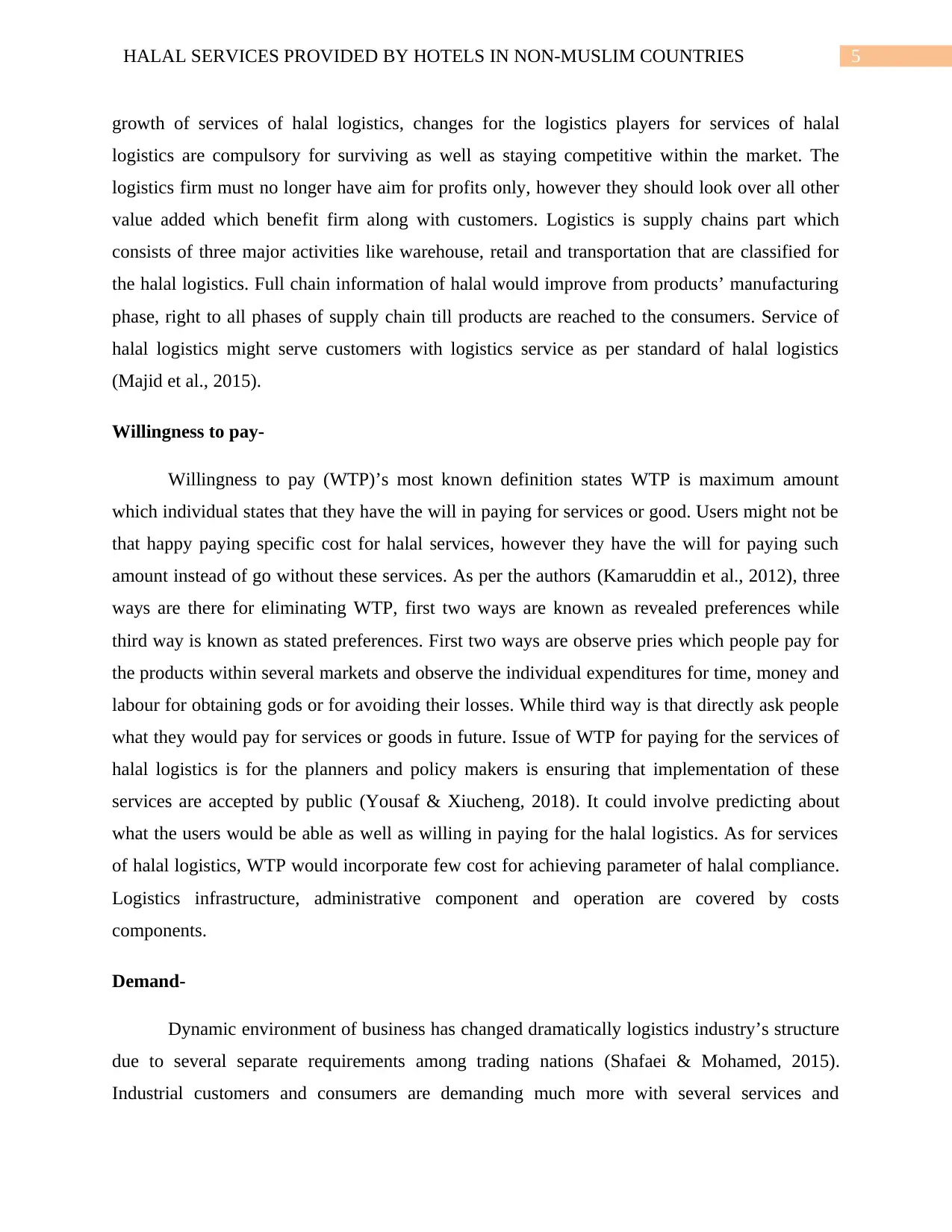
5HALAL SERVICES PROVIDED BY HOTELS IN NON-MUSLIM COUNTRIES
growth of services of halal logistics, changes for the logistics players for services of halal
logistics are compulsory for surviving as well as staying competitive within the market. The
logistics firm must no longer have aim for profits only, however they should look over all other
value added which benefit firm along with customers. Logistics is supply chains part which
consists of three major activities like warehouse, retail and transportation that are classified for
the halal logistics. Full chain information of halal would improve from products’ manufacturing
phase, right to all phases of supply chain till products are reached to the consumers. Service of
halal logistics might serve customers with logistics service as per standard of halal logistics
(Majid et al., 2015).
Willingness to pay-
Willingness to pay (WTP)’s most known definition states WTP is maximum amount
which individual states that they have the will in paying for services or good. Users might not be
that happy paying specific cost for halal services, however they have the will for paying such
amount instead of go without these services. As per the authors (Kamaruddin et al., 2012), three
ways are there for eliminating WTP, first two ways are known as revealed preferences while
third way is known as stated preferences. First two ways are observe pries which people pay for
the products within several markets and observe the individual expenditures for time, money and
labour for obtaining gods or for avoiding their losses. While third way is that directly ask people
what they would pay for services or goods in future. Issue of WTP for paying for the services of
halal logistics is for the planners and policy makers is ensuring that implementation of these
services are accepted by public (Yousaf & Xiucheng, 2018). It could involve predicting about
what the users would be able as well as willing in paying for the halal logistics. As for services
of halal logistics, WTP would incorporate few cost for achieving parameter of halal compliance.
Logistics infrastructure, administrative component and operation are covered by costs
components.
Demand-
Dynamic environment of business has changed dramatically logistics industry’s structure
due to several separate requirements among trading nations (Shafaei & Mohamed, 2015).
Industrial customers and consumers are demanding much more with several services and
growth of services of halal logistics, changes for the logistics players for services of halal
logistics are compulsory for surviving as well as staying competitive within the market. The
logistics firm must no longer have aim for profits only, however they should look over all other
value added which benefit firm along with customers. Logistics is supply chains part which
consists of three major activities like warehouse, retail and transportation that are classified for
the halal logistics. Full chain information of halal would improve from products’ manufacturing
phase, right to all phases of supply chain till products are reached to the consumers. Service of
halal logistics might serve customers with logistics service as per standard of halal logistics
(Majid et al., 2015).
Willingness to pay-
Willingness to pay (WTP)’s most known definition states WTP is maximum amount
which individual states that they have the will in paying for services or good. Users might not be
that happy paying specific cost for halal services, however they have the will for paying such
amount instead of go without these services. As per the authors (Kamaruddin et al., 2012), three
ways are there for eliminating WTP, first two ways are known as revealed preferences while
third way is known as stated preferences. First two ways are observe pries which people pay for
the products within several markets and observe the individual expenditures for time, money and
labour for obtaining gods or for avoiding their losses. While third way is that directly ask people
what they would pay for services or goods in future. Issue of WTP for paying for the services of
halal logistics is for the planners and policy makers is ensuring that implementation of these
services are accepted by public (Yousaf & Xiucheng, 2018). It could involve predicting about
what the users would be able as well as willing in paying for the halal logistics. As for services
of halal logistics, WTP would incorporate few cost for achieving parameter of halal compliance.
Logistics infrastructure, administrative component and operation are covered by costs
components.
Demand-
Dynamic environment of business has changed dramatically logistics industry’s structure
due to several separate requirements among trading nations (Shafaei & Mohamed, 2015).
Industrial customers and consumers are demanding much more with several services and
⊘ This is a preview!⊘
Do you want full access?
Subscribe today to unlock all pages.

Trusted by 1+ million students worldwide
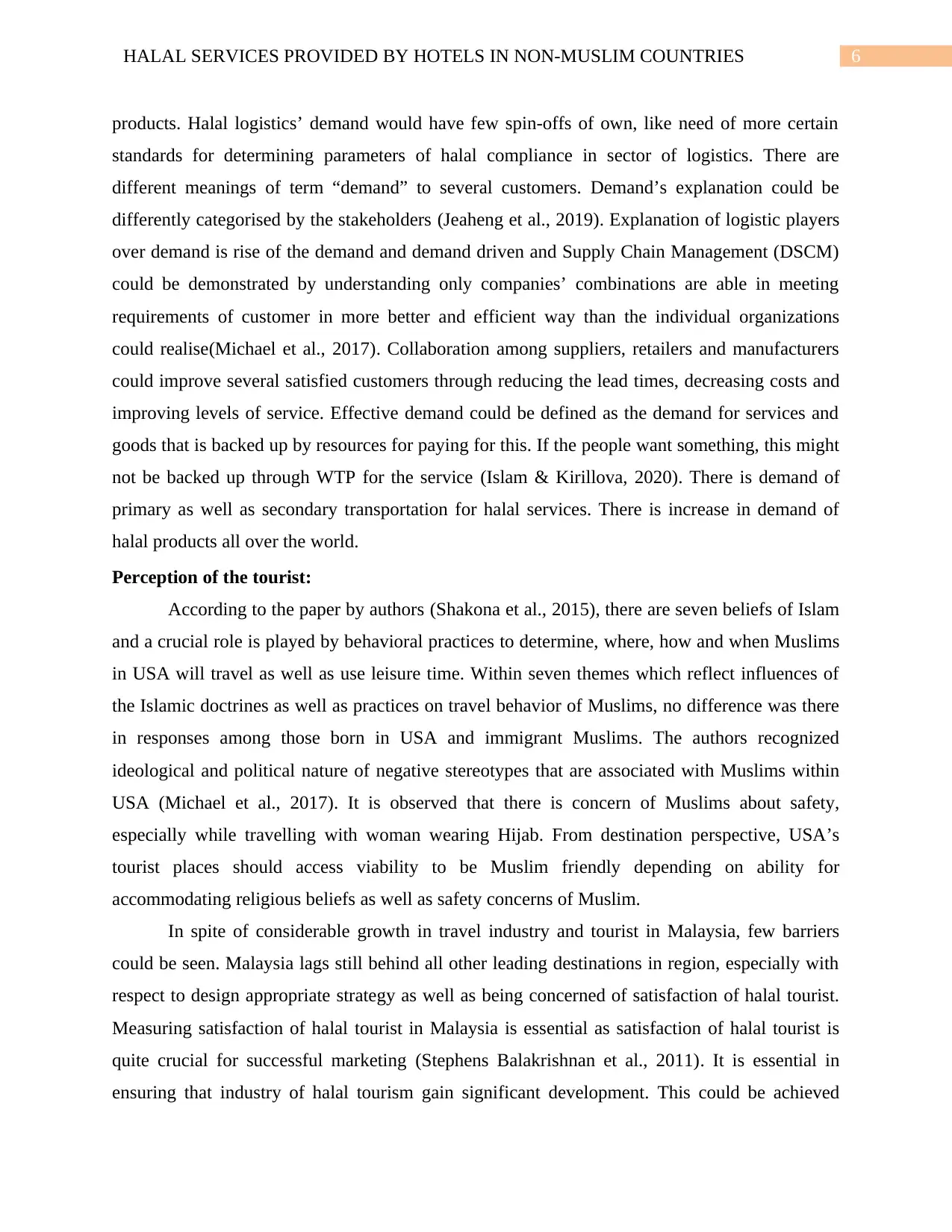
6HALAL SERVICES PROVIDED BY HOTELS IN NON-MUSLIM COUNTRIES
products. Halal logistics’ demand would have few spin-offs of own, like need of more certain
standards for determining parameters of halal compliance in sector of logistics. There are
different meanings of term “demand” to several customers. Demand’s explanation could be
differently categorised by the stakeholders (Jeaheng et al., 2019). Explanation of logistic players
over demand is rise of the demand and demand driven and Supply Chain Management (DSCM)
could be demonstrated by understanding only companies’ combinations are able in meeting
requirements of customer in more better and efficient way than the individual organizations
could realise(Michael et al., 2017). Collaboration among suppliers, retailers and manufacturers
could improve several satisfied customers through reducing the lead times, decreasing costs and
improving levels of service. Effective demand could be defined as the demand for services and
goods that is backed up by resources for paying for this. If the people want something, this might
not be backed up through WTP for the service (Islam & Kirillova, 2020). There is demand of
primary as well as secondary transportation for halal services. There is increase in demand of
halal products all over the world.
Perception of the tourist:
According to the paper by authors (Shakona et al., 2015), there are seven beliefs of Islam
and a crucial role is played by behavioral practices to determine, where, how and when Muslims
in USA will travel as well as use leisure time. Within seven themes which reflect influences of
the Islamic doctrines as well as practices on travel behavior of Muslims, no difference was there
in responses among those born in USA and immigrant Muslims. The authors recognized
ideological and political nature of negative stereotypes that are associated with Muslims within
USA (Michael et al., 2017). It is observed that there is concern of Muslims about safety,
especially while travelling with woman wearing Hijab. From destination perspective, USA’s
tourist places should access viability to be Muslim friendly depending on ability for
accommodating religious beliefs as well as safety concerns of Muslim.
In spite of considerable growth in travel industry and tourist in Malaysia, few barriers
could be seen. Malaysia lags still behind all other leading destinations in region, especially with
respect to design appropriate strategy as well as being concerned of satisfaction of halal tourist.
Measuring satisfaction of halal tourist in Malaysia is essential as satisfaction of halal tourist is
quite crucial for successful marketing (Stephens Balakrishnan et al., 2011). It is essential in
ensuring that industry of halal tourism gain significant development. This could be achieved
products. Halal logistics’ demand would have few spin-offs of own, like need of more certain
standards for determining parameters of halal compliance in sector of logistics. There are
different meanings of term “demand” to several customers. Demand’s explanation could be
differently categorised by the stakeholders (Jeaheng et al., 2019). Explanation of logistic players
over demand is rise of the demand and demand driven and Supply Chain Management (DSCM)
could be demonstrated by understanding only companies’ combinations are able in meeting
requirements of customer in more better and efficient way than the individual organizations
could realise(Michael et al., 2017). Collaboration among suppliers, retailers and manufacturers
could improve several satisfied customers through reducing the lead times, decreasing costs and
improving levels of service. Effective demand could be defined as the demand for services and
goods that is backed up by resources for paying for this. If the people want something, this might
not be backed up through WTP for the service (Islam & Kirillova, 2020). There is demand of
primary as well as secondary transportation for halal services. There is increase in demand of
halal products all over the world.
Perception of the tourist:
According to the paper by authors (Shakona et al., 2015), there are seven beliefs of Islam
and a crucial role is played by behavioral practices to determine, where, how and when Muslims
in USA will travel as well as use leisure time. Within seven themes which reflect influences of
the Islamic doctrines as well as practices on travel behavior of Muslims, no difference was there
in responses among those born in USA and immigrant Muslims. The authors recognized
ideological and political nature of negative stereotypes that are associated with Muslims within
USA (Michael et al., 2017). It is observed that there is concern of Muslims about safety,
especially while travelling with woman wearing Hijab. From destination perspective, USA’s
tourist places should access viability to be Muslim friendly depending on ability for
accommodating religious beliefs as well as safety concerns of Muslim.
In spite of considerable growth in travel industry and tourist in Malaysia, few barriers
could be seen. Malaysia lags still behind all other leading destinations in region, especially with
respect to design appropriate strategy as well as being concerned of satisfaction of halal tourist.
Measuring satisfaction of halal tourist in Malaysia is essential as satisfaction of halal tourist is
quite crucial for successful marketing (Stephens Balakrishnan et al., 2011). It is essential in
ensuring that industry of halal tourism gain significant development. This could be achieved
Paraphrase This Document
Need a fresh take? Get an instant paraphrase of this document with our AI Paraphraser
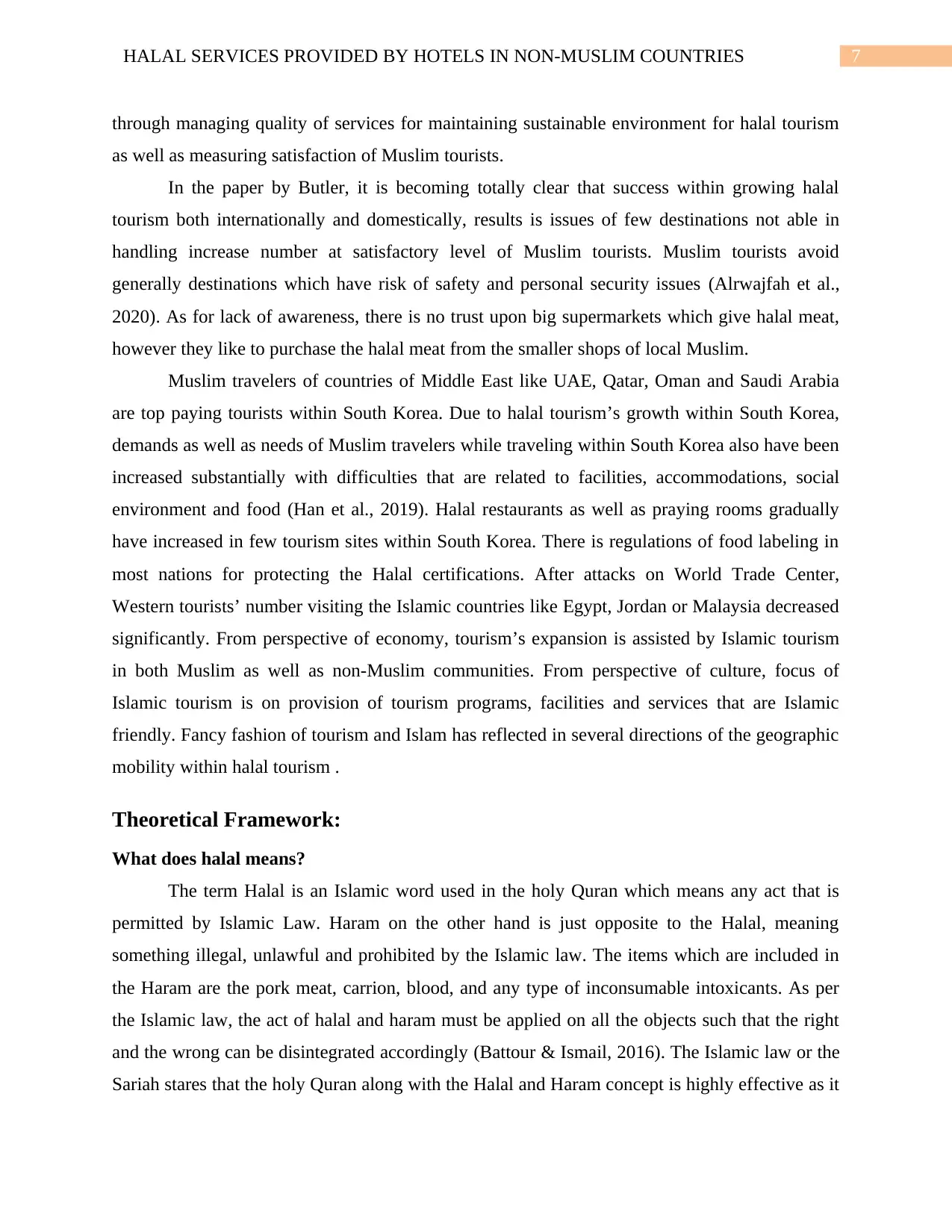
7HALAL SERVICES PROVIDED BY HOTELS IN NON-MUSLIM COUNTRIES
through managing quality of services for maintaining sustainable environment for halal tourism
as well as measuring satisfaction of Muslim tourists.
In the paper by Butler, it is becoming totally clear that success within growing halal
tourism both internationally and domestically, results is issues of few destinations not able in
handling increase number at satisfactory level of Muslim tourists. Muslim tourists avoid
generally destinations which have risk of safety and personal security issues (Alrwajfah et al.,
2020). As for lack of awareness, there is no trust upon big supermarkets which give halal meat,
however they like to purchase the halal meat from the smaller shops of local Muslim.
Muslim travelers of countries of Middle East like UAE, Qatar, Oman and Saudi Arabia
are top paying tourists within South Korea. Due to halal tourism’s growth within South Korea,
demands as well as needs of Muslim travelers while traveling within South Korea also have been
increased substantially with difficulties that are related to facilities, accommodations, social
environment and food (Han et al., 2019). Halal restaurants as well as praying rooms gradually
have increased in few tourism sites within South Korea. There is regulations of food labeling in
most nations for protecting the Halal certifications. After attacks on World Trade Center,
Western tourists’ number visiting the Islamic countries like Egypt, Jordan or Malaysia decreased
significantly. From perspective of economy, tourism’s expansion is assisted by Islamic tourism
in both Muslim as well as non-Muslim communities. From perspective of culture, focus of
Islamic tourism is on provision of tourism programs, facilities and services that are Islamic
friendly. Fancy fashion of tourism and Islam has reflected in several directions of the geographic
mobility within halal tourism .
Theoretical Framework:
What does halal means?
The term Halal is an Islamic word used in the holy Quran which means any act that is
permitted by Islamic Law. Haram on the other hand is just opposite to the Halal, meaning
something illegal, unlawful and prohibited by the Islamic law. The items which are included in
the Haram are the pork meat, carrion, blood, and any type of inconsumable intoxicants. As per
the Islamic law, the act of halal and haram must be applied on all the objects such that the right
and the wrong can be disintegrated accordingly (Battour & Ismail, 2016). The Islamic law or the
Sariah stares that the holy Quran along with the Halal and Haram concept is highly effective as it
through managing quality of services for maintaining sustainable environment for halal tourism
as well as measuring satisfaction of Muslim tourists.
In the paper by Butler, it is becoming totally clear that success within growing halal
tourism both internationally and domestically, results is issues of few destinations not able in
handling increase number at satisfactory level of Muslim tourists. Muslim tourists avoid
generally destinations which have risk of safety and personal security issues (Alrwajfah et al.,
2020). As for lack of awareness, there is no trust upon big supermarkets which give halal meat,
however they like to purchase the halal meat from the smaller shops of local Muslim.
Muslim travelers of countries of Middle East like UAE, Qatar, Oman and Saudi Arabia
are top paying tourists within South Korea. Due to halal tourism’s growth within South Korea,
demands as well as needs of Muslim travelers while traveling within South Korea also have been
increased substantially with difficulties that are related to facilities, accommodations, social
environment and food (Han et al., 2019). Halal restaurants as well as praying rooms gradually
have increased in few tourism sites within South Korea. There is regulations of food labeling in
most nations for protecting the Halal certifications. After attacks on World Trade Center,
Western tourists’ number visiting the Islamic countries like Egypt, Jordan or Malaysia decreased
significantly. From perspective of economy, tourism’s expansion is assisted by Islamic tourism
in both Muslim as well as non-Muslim communities. From perspective of culture, focus of
Islamic tourism is on provision of tourism programs, facilities and services that are Islamic
friendly. Fancy fashion of tourism and Islam has reflected in several directions of the geographic
mobility within halal tourism .
Theoretical Framework:
What does halal means?
The term Halal is an Islamic word used in the holy Quran which means any act that is
permitted by Islamic Law. Haram on the other hand is just opposite to the Halal, meaning
something illegal, unlawful and prohibited by the Islamic law. The items which are included in
the Haram are the pork meat, carrion, blood, and any type of inconsumable intoxicants. As per
the Islamic law, the act of halal and haram must be applied on all the objects such that the right
and the wrong can be disintegrated accordingly (Battour & Ismail, 2016). The Islamic law or the
Sariah stares that the holy Quran along with the Halal and Haram concept is highly effective as it
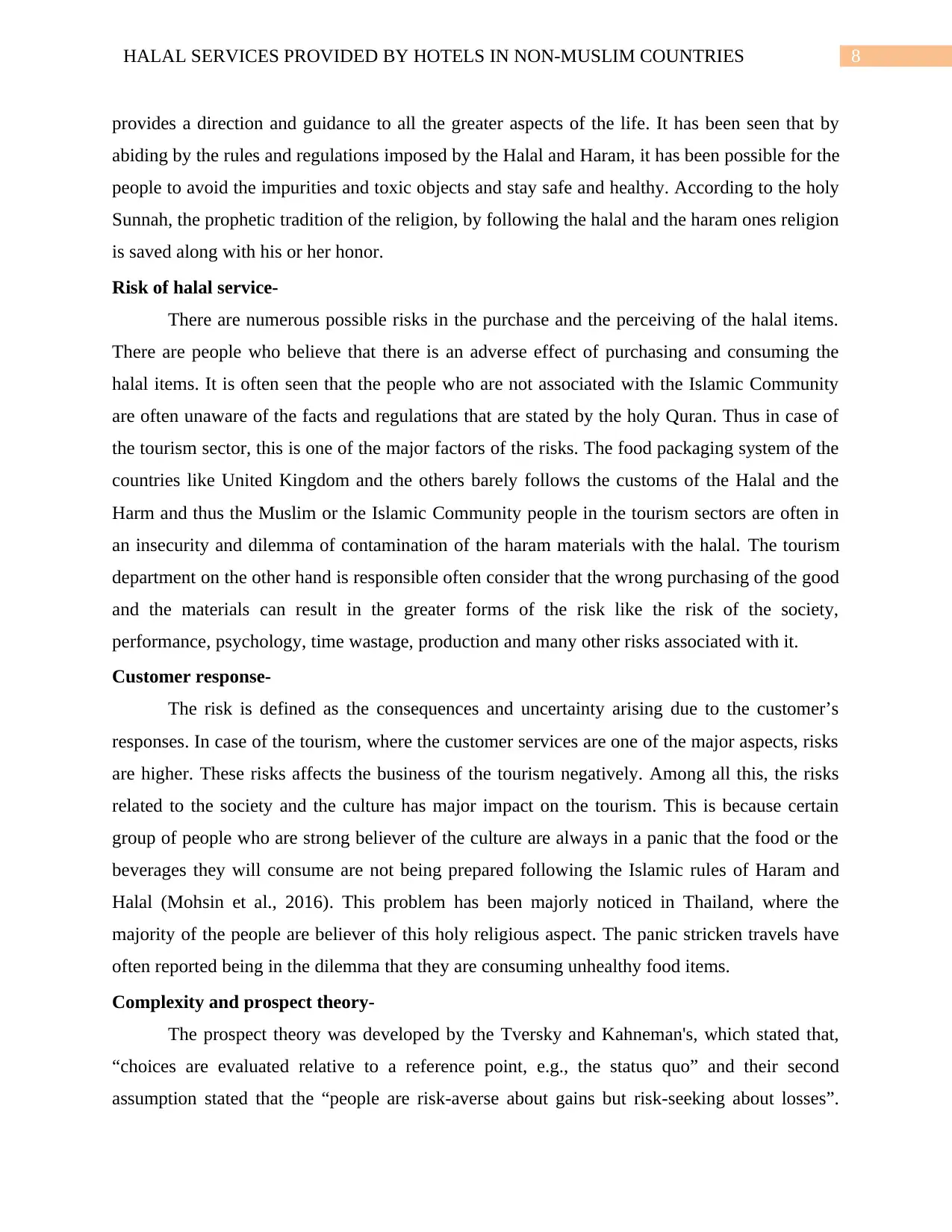
8HALAL SERVICES PROVIDED BY HOTELS IN NON-MUSLIM COUNTRIES
provides a direction and guidance to all the greater aspects of the life. It has been seen that by
abiding by the rules and regulations imposed by the Halal and Haram, it has been possible for the
people to avoid the impurities and toxic objects and stay safe and healthy. According to the holy
Sunnah, the prophetic tradition of the religion, by following the halal and the haram ones religion
is saved along with his or her honor.
Risk of halal service-
There are numerous possible risks in the purchase and the perceiving of the halal items.
There are people who believe that there is an adverse effect of purchasing and consuming the
halal items. It is often seen that the people who are not associated with the Islamic Community
are often unaware of the facts and regulations that are stated by the holy Quran. Thus in case of
the tourism sector, this is one of the major factors of the risks. The food packaging system of the
countries like United Kingdom and the others barely follows the customs of the Halal and the
Harm and thus the Muslim or the Islamic Community people in the tourism sectors are often in
an insecurity and dilemma of contamination of the haram materials with the halal. The tourism
department on the other hand is responsible often consider that the wrong purchasing of the good
and the materials can result in the greater forms of the risk like the risk of the society,
performance, psychology, time wastage, production and many other risks associated with it.
Customer response-
The risk is defined as the consequences and uncertainty arising due to the customer’s
responses. In case of the tourism, where the customer services are one of the major aspects, risks
are higher. These risks affects the business of the tourism negatively. Among all this, the risks
related to the society and the culture has major impact on the tourism. This is because certain
group of people who are strong believer of the culture are always in a panic that the food or the
beverages they will consume are not being prepared following the Islamic rules of Haram and
Halal (Mohsin et al., 2016). This problem has been majorly noticed in Thailand, where the
majority of the people are believer of this holy religious aspect. The panic stricken travels have
often reported being in the dilemma that they are consuming unhealthy food items.
Complexity and prospect theory-
The prospect theory was developed by the Tversky and Kahneman's, which stated that,
“choices are evaluated relative to a reference point, e.g., the status quo” and their second
assumption stated that the “people are risk-averse about gains but risk-seeking about losses”.
provides a direction and guidance to all the greater aspects of the life. It has been seen that by
abiding by the rules and regulations imposed by the Halal and Haram, it has been possible for the
people to avoid the impurities and toxic objects and stay safe and healthy. According to the holy
Sunnah, the prophetic tradition of the religion, by following the halal and the haram ones religion
is saved along with his or her honor.
Risk of halal service-
There are numerous possible risks in the purchase and the perceiving of the halal items.
There are people who believe that there is an adverse effect of purchasing and consuming the
halal items. It is often seen that the people who are not associated with the Islamic Community
are often unaware of the facts and regulations that are stated by the holy Quran. Thus in case of
the tourism sector, this is one of the major factors of the risks. The food packaging system of the
countries like United Kingdom and the others barely follows the customs of the Halal and the
Harm and thus the Muslim or the Islamic Community people in the tourism sectors are often in
an insecurity and dilemma of contamination of the haram materials with the halal. The tourism
department on the other hand is responsible often consider that the wrong purchasing of the good
and the materials can result in the greater forms of the risk like the risk of the society,
performance, psychology, time wastage, production and many other risks associated with it.
Customer response-
The risk is defined as the consequences and uncertainty arising due to the customer’s
responses. In case of the tourism, where the customer services are one of the major aspects, risks
are higher. These risks affects the business of the tourism negatively. Among all this, the risks
related to the society and the culture has major impact on the tourism. This is because certain
group of people who are strong believer of the culture are always in a panic that the food or the
beverages they will consume are not being prepared following the Islamic rules of Haram and
Halal (Mohsin et al., 2016). This problem has been majorly noticed in Thailand, where the
majority of the people are believer of this holy religious aspect. The panic stricken travels have
often reported being in the dilemma that they are consuming unhealthy food items.
Complexity and prospect theory-
The prospect theory was developed by the Tversky and Kahneman's, which stated that,
“choices are evaluated relative to a reference point, e.g., the status quo” and their second
assumption stated that the “people are risk-averse about gains but risk-seeking about losses”.
⊘ This is a preview!⊘
Do you want full access?
Subscribe today to unlock all pages.

Trusted by 1+ million students worldwide
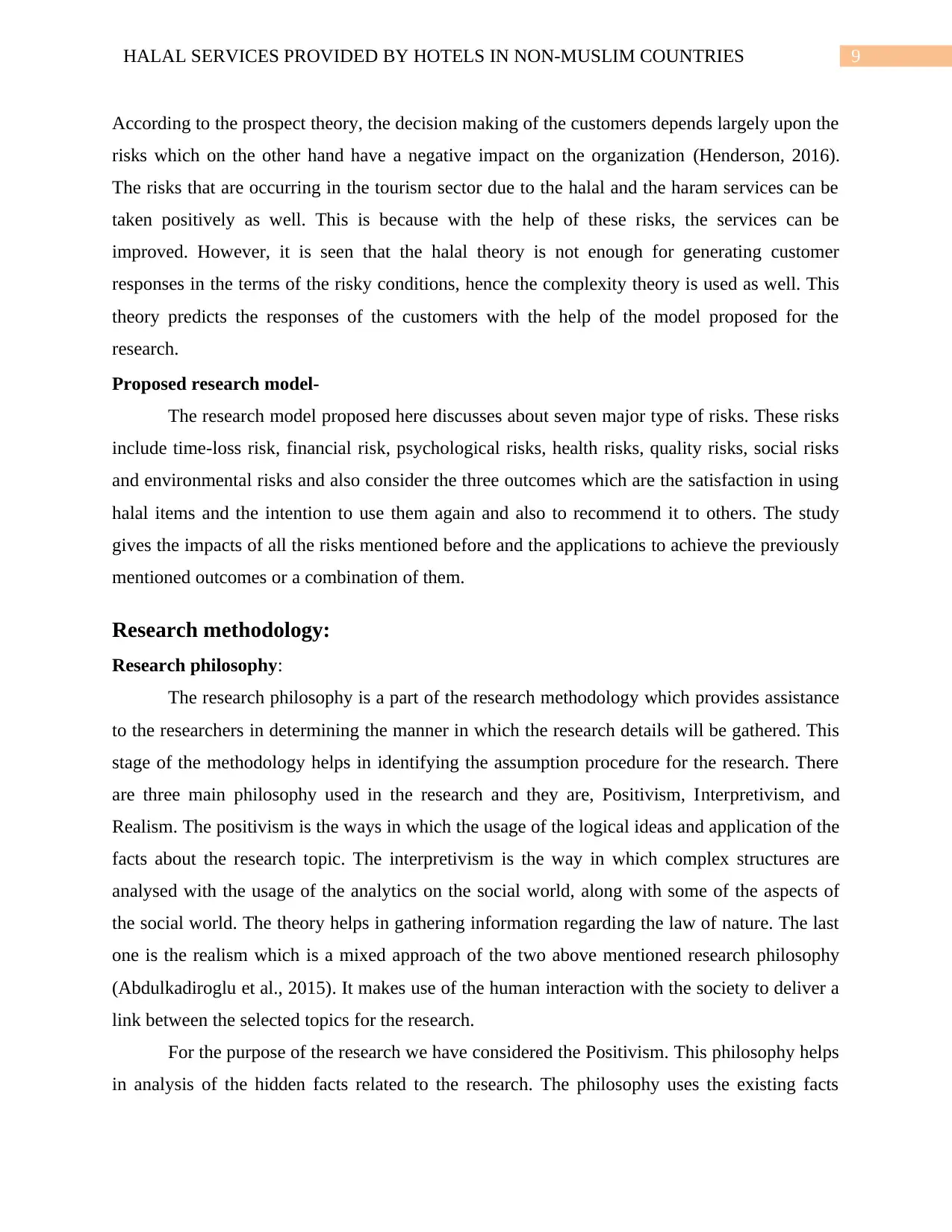
9HALAL SERVICES PROVIDED BY HOTELS IN NON-MUSLIM COUNTRIES
According to the prospect theory, the decision making of the customers depends largely upon the
risks which on the other hand have a negative impact on the organization (Henderson, 2016).
The risks that are occurring in the tourism sector due to the halal and the haram services can be
taken positively as well. This is because with the help of these risks, the services can be
improved. However, it is seen that the halal theory is not enough for generating customer
responses in the terms of the risky conditions, hence the complexity theory is used as well. This
theory predicts the responses of the customers with the help of the model proposed for the
research.
Proposed research model-
The research model proposed here discusses about seven major type of risks. These risks
include time-loss risk, financial risk, psychological risks, health risks, quality risks, social risks
and environmental risks and also consider the three outcomes which are the satisfaction in using
halal items and the intention to use them again and also to recommend it to others. The study
gives the impacts of all the risks mentioned before and the applications to achieve the previously
mentioned outcomes or a combination of them.
Research methodology:
Research philosophy:
The research philosophy is a part of the research methodology which provides assistance
to the researchers in determining the manner in which the research details will be gathered. This
stage of the methodology helps in identifying the assumption procedure for the research. There
are three main philosophy used in the research and they are, Positivism, Interpretivism, and
Realism. The positivism is the ways in which the usage of the logical ideas and application of the
facts about the research topic. The interpretivism is the way in which complex structures are
analysed with the usage of the analytics on the social world, along with some of the aspects of
the social world. The theory helps in gathering information regarding the law of nature. The last
one is the realism which is a mixed approach of the two above mentioned research philosophy
(Abdulkadiroglu et al., 2015). It makes use of the human interaction with the society to deliver a
link between the selected topics for the research.
For the purpose of the research we have considered the Positivism. This philosophy helps
in analysis of the hidden facts related to the research. The philosophy uses the existing facts
According to the prospect theory, the decision making of the customers depends largely upon the
risks which on the other hand have a negative impact on the organization (Henderson, 2016).
The risks that are occurring in the tourism sector due to the halal and the haram services can be
taken positively as well. This is because with the help of these risks, the services can be
improved. However, it is seen that the halal theory is not enough for generating customer
responses in the terms of the risky conditions, hence the complexity theory is used as well. This
theory predicts the responses of the customers with the help of the model proposed for the
research.
Proposed research model-
The research model proposed here discusses about seven major type of risks. These risks
include time-loss risk, financial risk, psychological risks, health risks, quality risks, social risks
and environmental risks and also consider the three outcomes which are the satisfaction in using
halal items and the intention to use them again and also to recommend it to others. The study
gives the impacts of all the risks mentioned before and the applications to achieve the previously
mentioned outcomes or a combination of them.
Research methodology:
Research philosophy:
The research philosophy is a part of the research methodology which provides assistance
to the researchers in determining the manner in which the research details will be gathered. This
stage of the methodology helps in identifying the assumption procedure for the research. There
are three main philosophy used in the research and they are, Positivism, Interpretivism, and
Realism. The positivism is the ways in which the usage of the logical ideas and application of the
facts about the research topic. The interpretivism is the way in which complex structures are
analysed with the usage of the analytics on the social world, along with some of the aspects of
the social world. The theory helps in gathering information regarding the law of nature. The last
one is the realism which is a mixed approach of the two above mentioned research philosophy
(Abdulkadiroglu et al., 2015). It makes use of the human interaction with the society to deliver a
link between the selected topics for the research.
For the purpose of the research we have considered the Positivism. This philosophy helps
in analysis of the hidden facts related to the research. The philosophy uses the existing facts
Paraphrase This Document
Need a fresh take? Get an instant paraphrase of this document with our AI Paraphraser
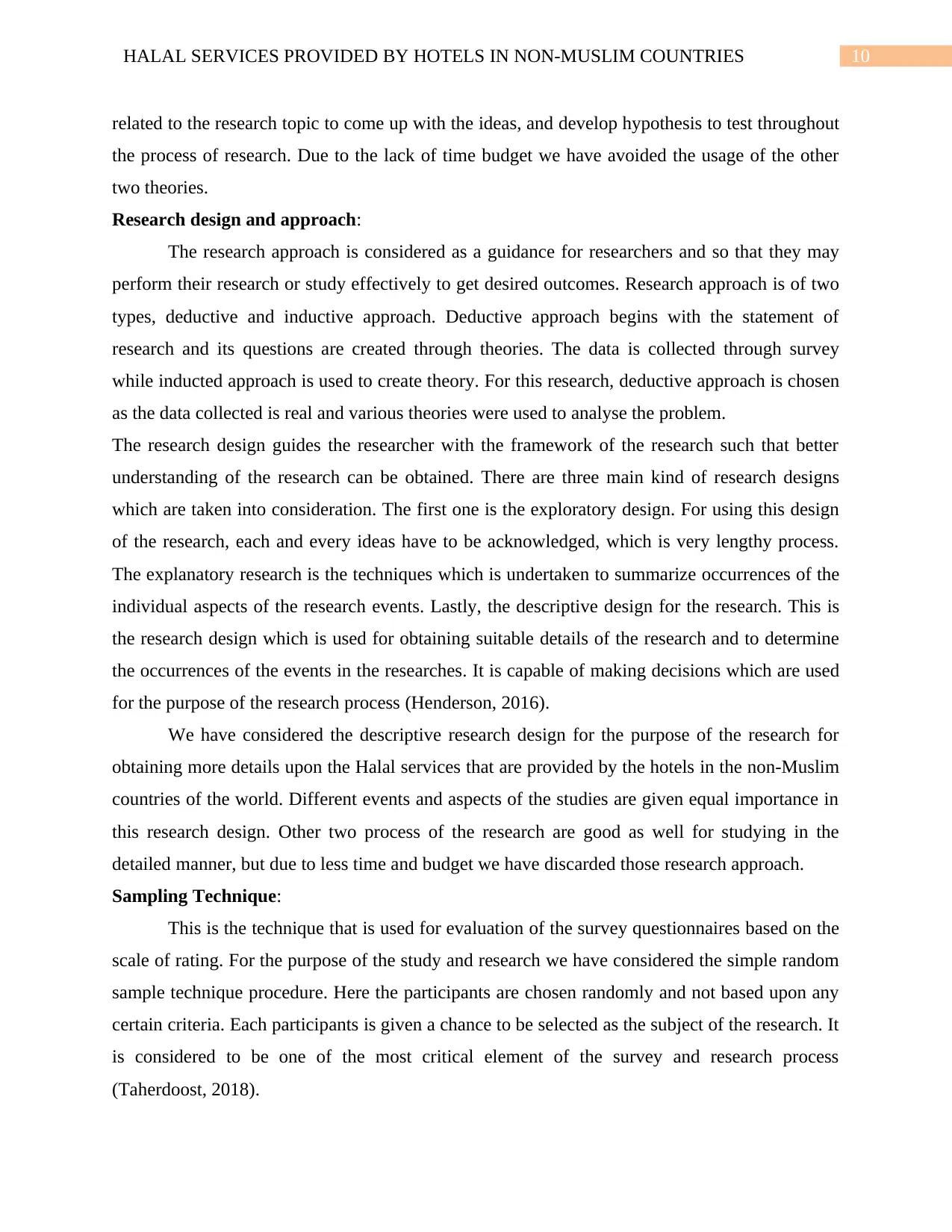
10HALAL SERVICES PROVIDED BY HOTELS IN NON-MUSLIM COUNTRIES
related to the research topic to come up with the ideas, and develop hypothesis to test throughout
the process of research. Due to the lack of time budget we have avoided the usage of the other
two theories.
Research design and approach:
The research approach is considered as a guidance for researchers and so that they may
perform their research or study effectively to get desired outcomes. Research approach is of two
types, deductive and inductive approach. Deductive approach begins with the statement of
research and its questions are created through theories. The data is collected through survey
while inducted approach is used to create theory. For this research, deductive approach is chosen
as the data collected is real and various theories were used to analyse the problem.
The research design guides the researcher with the framework of the research such that better
understanding of the research can be obtained. There are three main kind of research designs
which are taken into consideration. The first one is the exploratory design. For using this design
of the research, each and every ideas have to be acknowledged, which is very lengthy process.
The explanatory research is the techniques which is undertaken to summarize occurrences of the
individual aspects of the research events. Lastly, the descriptive design for the research. This is
the research design which is used for obtaining suitable details of the research and to determine
the occurrences of the events in the researches. It is capable of making decisions which are used
for the purpose of the research process (Henderson, 2016).
We have considered the descriptive research design for the purpose of the research for
obtaining more details upon the Halal services that are provided by the hotels in the non-Muslim
countries of the world. Different events and aspects of the studies are given equal importance in
this research design. Other two process of the research are good as well for studying in the
detailed manner, but due to less time and budget we have discarded those research approach.
Sampling Technique:
This is the technique that is used for evaluation of the survey questionnaires based on the
scale of rating. For the purpose of the study and research we have considered the simple random
sample technique procedure. Here the participants are chosen randomly and not based upon any
certain criteria. Each participants is given a chance to be selected as the subject of the research. It
is considered to be one of the most critical element of the survey and research process
(Taherdoost, 2018).
related to the research topic to come up with the ideas, and develop hypothesis to test throughout
the process of research. Due to the lack of time budget we have avoided the usage of the other
two theories.
Research design and approach:
The research approach is considered as a guidance for researchers and so that they may
perform their research or study effectively to get desired outcomes. Research approach is of two
types, deductive and inductive approach. Deductive approach begins with the statement of
research and its questions are created through theories. The data is collected through survey
while inducted approach is used to create theory. For this research, deductive approach is chosen
as the data collected is real and various theories were used to analyse the problem.
The research design guides the researcher with the framework of the research such that better
understanding of the research can be obtained. There are three main kind of research designs
which are taken into consideration. The first one is the exploratory design. For using this design
of the research, each and every ideas have to be acknowledged, which is very lengthy process.
The explanatory research is the techniques which is undertaken to summarize occurrences of the
individual aspects of the research events. Lastly, the descriptive design for the research. This is
the research design which is used for obtaining suitable details of the research and to determine
the occurrences of the events in the researches. It is capable of making decisions which are used
for the purpose of the research process (Henderson, 2016).
We have considered the descriptive research design for the purpose of the research for
obtaining more details upon the Halal services that are provided by the hotels in the non-Muslim
countries of the world. Different events and aspects of the studies are given equal importance in
this research design. Other two process of the research are good as well for studying in the
detailed manner, but due to less time and budget we have discarded those research approach.
Sampling Technique:
This is the technique that is used for evaluation of the survey questionnaires based on the
scale of rating. For the purpose of the study and research we have considered the simple random
sample technique procedure. Here the participants are chosen randomly and not based upon any
certain criteria. Each participants is given a chance to be selected as the subject of the research. It
is considered to be one of the most critical element of the survey and research process
(Taherdoost, 2018).
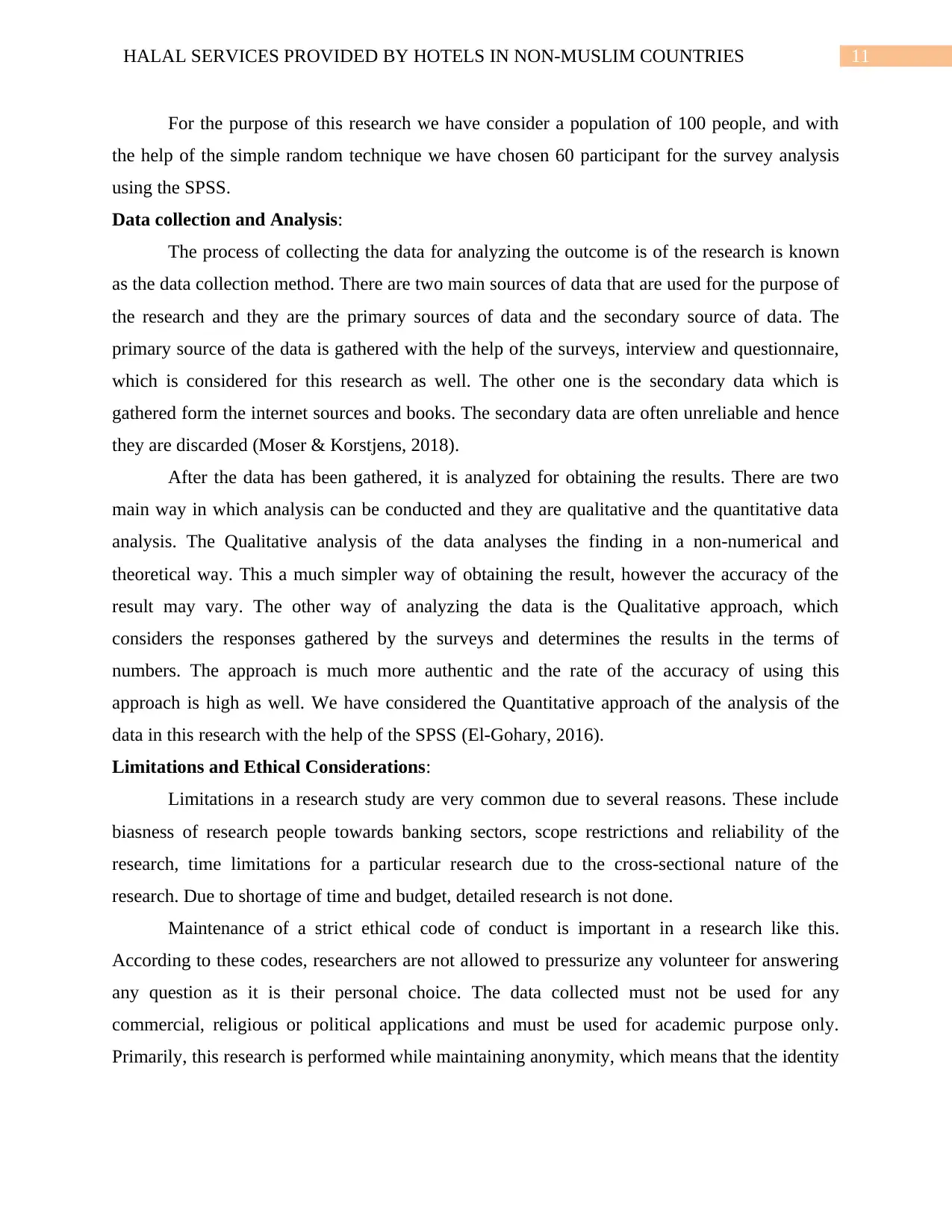
11HALAL SERVICES PROVIDED BY HOTELS IN NON-MUSLIM COUNTRIES
For the purpose of this research we have consider a population of 100 people, and with
the help of the simple random technique we have chosen 60 participant for the survey analysis
using the SPSS.
Data collection and Analysis:
The process of collecting the data for analyzing the outcome is of the research is known
as the data collection method. There are two main sources of data that are used for the purpose of
the research and they are the primary sources of data and the secondary source of data. The
primary source of the data is gathered with the help of the surveys, interview and questionnaire,
which is considered for this research as well. The other one is the secondary data which is
gathered form the internet sources and books. The secondary data are often unreliable and hence
they are discarded (Moser & Korstjens, 2018).
After the data has been gathered, it is analyzed for obtaining the results. There are two
main way in which analysis can be conducted and they are qualitative and the quantitative data
analysis. The Qualitative analysis of the data analyses the finding in a non-numerical and
theoretical way. This a much simpler way of obtaining the result, however the accuracy of the
result may vary. The other way of analyzing the data is the Qualitative approach, which
considers the responses gathered by the surveys and determines the results in the terms of
numbers. The approach is much more authentic and the rate of the accuracy of using this
approach is high as well. We have considered the Quantitative approach of the analysis of the
data in this research with the help of the SPSS (El-Gohary, 2016).
Limitations and Ethical Considerations:
Limitations in a research study are very common due to several reasons. These include
biasness of research people towards banking sectors, scope restrictions and reliability of the
research, time limitations for a particular research due to the cross-sectional nature of the
research. Due to shortage of time and budget, detailed research is not done.
Maintenance of a strict ethical code of conduct is important in a research like this.
According to these codes, researchers are not allowed to pressurize any volunteer for answering
any question as it is their personal choice. The data collected must not be used for any
commercial, religious or political applications and must be used for academic purpose only.
Primarily, this research is performed while maintaining anonymity, which means that the identity
For the purpose of this research we have consider a population of 100 people, and with
the help of the simple random technique we have chosen 60 participant for the survey analysis
using the SPSS.
Data collection and Analysis:
The process of collecting the data for analyzing the outcome is of the research is known
as the data collection method. There are two main sources of data that are used for the purpose of
the research and they are the primary sources of data and the secondary source of data. The
primary source of the data is gathered with the help of the surveys, interview and questionnaire,
which is considered for this research as well. The other one is the secondary data which is
gathered form the internet sources and books. The secondary data are often unreliable and hence
they are discarded (Moser & Korstjens, 2018).
After the data has been gathered, it is analyzed for obtaining the results. There are two
main way in which analysis can be conducted and they are qualitative and the quantitative data
analysis. The Qualitative analysis of the data analyses the finding in a non-numerical and
theoretical way. This a much simpler way of obtaining the result, however the accuracy of the
result may vary. The other way of analyzing the data is the Qualitative approach, which
considers the responses gathered by the surveys and determines the results in the terms of
numbers. The approach is much more authentic and the rate of the accuracy of using this
approach is high as well. We have considered the Quantitative approach of the analysis of the
data in this research with the help of the SPSS (El-Gohary, 2016).
Limitations and Ethical Considerations:
Limitations in a research study are very common due to several reasons. These include
biasness of research people towards banking sectors, scope restrictions and reliability of the
research, time limitations for a particular research due to the cross-sectional nature of the
research. Due to shortage of time and budget, detailed research is not done.
Maintenance of a strict ethical code of conduct is important in a research like this.
According to these codes, researchers are not allowed to pressurize any volunteer for answering
any question as it is their personal choice. The data collected must not be used for any
commercial, religious or political applications and must be used for academic purpose only.
Primarily, this research is performed while maintaining anonymity, which means that the identity
⊘ This is a preview!⊘
Do you want full access?
Subscribe today to unlock all pages.

Trusted by 1+ million students worldwide
1 out of 27
Related Documents
Your All-in-One AI-Powered Toolkit for Academic Success.
+13062052269
info@desklib.com
Available 24*7 on WhatsApp / Email
![[object Object]](/_next/static/media/star-bottom.7253800d.svg)
Unlock your academic potential
Copyright © 2020–2026 A2Z Services. All Rights Reserved. Developed and managed by ZUCOL.




